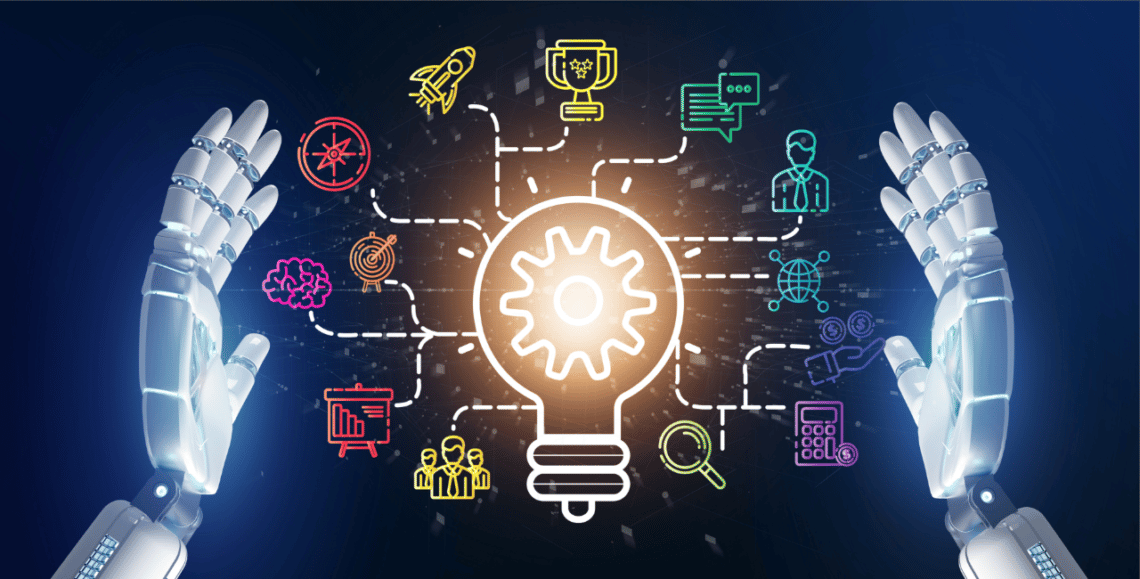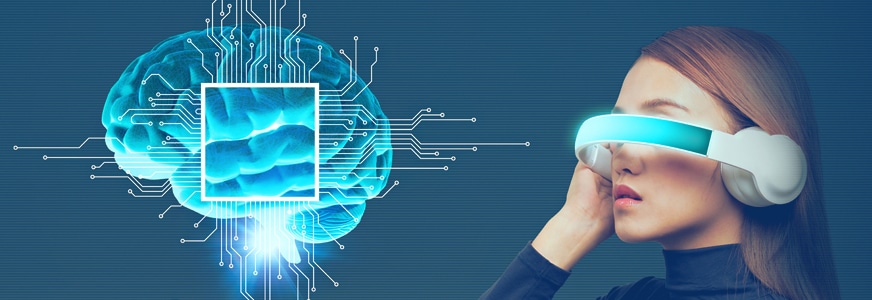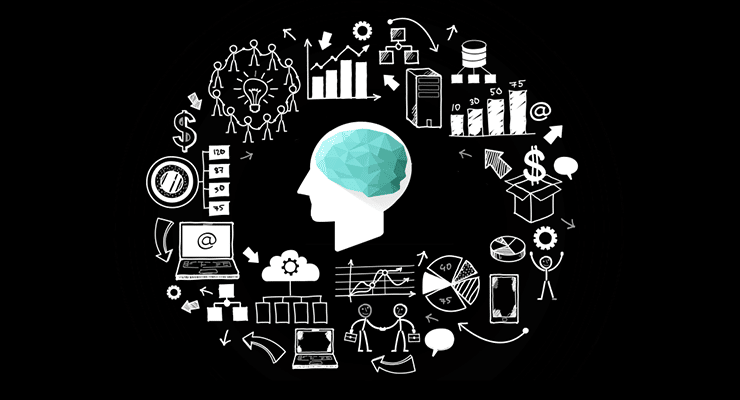AI has evolved from being science fiction to reality in just a few years. We now live in a world of artificial intelligence, which was only a story for a while. Artificial intelligence (AI) is the process of enabling computers to make decisions using their own intellect. It is a branch of research in which we want computers to perform tasks that we humans accomplish.
AI is a cutting-edge area of computer science that is expected to dominate a number of developing industries, including big data, robots, and the internet of things. In the upcoming years, it will continue to lead the way in technological innovation. Rapid advancement and change are taking place in this field of technology. But it wasn’t as simple and straightforward as it looked to us. It has taken many years and a lot of strenuous work and contributions from many individuals to get AI to this point.
The Importance of Artificial Intelligence
AI is important since it has the potential to give organizations with previously unknown insights about how to operate their operations. Particularly when it comes to repetitive, detail-focused tasks like evaluating a large number of legal documents to ensure that critical fields are filled in accurately, AI systems usually do operate quickly and with relatively few errors. This has led to increased efficiency and given some larger businesses access to whole new market prospects. Artificial intelligence (AI) technologies such as deep learning and artificial neural networks are fast evolving, owing to AI’s ability to process massive amounts of data significantly more quickly and accurately than humans. A human researcher might be overburdened by the massive quantity of data collected every day, but AI technologies that apply machine learning can quickly translate that data into meaningful information.
The biggest and most prosperous businesses of today have utilized AI to enhance their operations and outperform rivals.
Artificial Intelligence at Present
We are all aware of the current scenario and the importance of AI in our life. AI gathers and organizes vast volumes of data to provide insights and estimates that are beyond the human capacity for manual processing. A mistake will be less likely to be made and unusual patterns will be more likely to be noticed because of its growing organizational efficiency. Currently, the technology is being used in a variety of industries, including transportation, education, manufacturing, banking, health care, and urban planning. While AI is being incorporated into quality control processes to improve output, predictive and preventive maintenance technologies in the manufacturing sector assist product producers to avoid expensive downtime. At the urban level, a growing range of “smart city” technologies are starting to fulfill their promise of streamlining the delivery of utilities, traffic management, trash management, and other important services.
Future of Artificial Intelligence
Artificial intelligence has impacted the world in subtle but profound ways during the last 10 years. These days, AI has a wide range of uses in practically every industry, which sounds beneficial and is replacing human occupations that can be seen negatively. From Alexa and Siri to chatbots, everyone now uses AI in their everyday lives. AI is also playing a critical role in healthcare and pharmaceuticals. As we can see, AI is becoming more prevalent in many aspects of our life. Its impact will eventually affect every part of our lives with innumerable applications that are rapidly emerging in business, government, and personal life. It’s fascinating to speculate about what our future may look like with this incredible progress of AI.
AI has spread to practically every industry, and we will explore the future of AI in the following important fields.
AI in Health Care – All citizens of our country do not have access to health care. It is due to a dearth of qualified doctors or a lack of adequate infrastructure. AI will be essential in the healthcare industry for making a quicker and more accurate diagnosis of illnesses.AI has the capability of detecting disease based on symptoms; even if you do not visit a doctor, AI can identify sickness. AI would use information from a person’s fitness band and medical history to identify patterns, propose the best course of treatment, and even deliver it to their phones, right at their fingertips. The application of AI will accelerate and lower the cost of discovering new medications. Furthermore, it will promote patient participation in their health care and make scheduling visits and paying fees easier and less error-prone.
An app called Google’s deep mind has already surpassed physicians in recognizing deadly diseases like breast cancer; it’s not far away when AI can detect common ailments and provide appropriate drug recommendations.
AI in Finance – Any country’s economic and financial situation has a direct impact on how much growth it experiences. A nation’s and an individual’s economic health may both benefit from AI, which has a wide range of applications in practically every industry. AI has a significant impact on corporate finance because it can more precisely detect and analyze credit risks. Machine learning and other AI technologies may enhance loan underwriting and lower financial risk for businesses wanting to raise their value.
AI in Military & Cybersecurity – AI-assisted military technologies have created autonomous weapon systems that won’t require any human interaction, creating the most secure means to improve a country’s security. Future military robots that are as clever as soldiers or commandos and are capable of performing some jobs may be on our horizon. AI-assisted tactics would improve mission efficacy and offer the most secure means to carry it out.
AI in Education – The level of education that young people are receiving has an impact on the growth of a nation. We can observe that there are now many courses offered on AI. AI will, however, change the traditional educational model in the future. Skilled laborers are no longer needed in the industrial sector since
automation and robotics have mostly taken their place. The educational system has the potential to be very successful and may be tailored to the personality and skills of each student. It would provide opportunities for smarter pupils to flourish and a better means of admission for not-so-bright students.
AI in Retail –With a variety of applications for better commercial decision-making, AI holds enormous potential for the future of retail. Future drones driven by AI could be able to transport products up to 5 pounds in less than 30 minutes. In addition to independent delivery, the future of AI in retail will be more autonomous and individualized, with plausible scenarios including virtual racks customized according to data-defined personas, connected changing rooms with screens, and a lot more personalization based on past behavior and trends that will make consumer decisions less stressful and chaotic.
Conclusion
The future of artificial intelligence is here and it’s coming soon. Artificial intelligence applications are projected to have a significant influence on important aspects of our economy and society in the future decade. Artificial intelligence-assisted technologies have the potential to significantly improve the quality of our lives. By making investments in education and AI certification, we can now get ready for the AI era. The decision is still yours: will you improve your abilities to stay on the cutting edge, or will you stay the same and stagnate in the business?
FAQs (Frequently Asked Questions)
- What is artificial intelligence?
Ans. The area of computer science known as artificial intelligence enables computers to carry out activities that would typically need human intellect. Professionals must complete AI Certification in order to comprehend how to apply the concepts in a commercial setting.
- Why is AI important?
Ans.The importance of AI technology may be attributed to the fact that it enables software to carry out human functions like thinking, reasoning, communication, and observation more accurately, efficiently, and economically. Artificial intelligence aids in the automation of activities, which, when done correctly, lowers mistakes and enables faster and more accurate decision-making.
- Is an AI certification valuable?
Ans. Artificial intelligence is a field of employment that necessitates advanced knowledge of popular AI abilities. To get the most benefits from the AI business, it is critical to supplement your educational credentials with the world’s top AI certification.
- What is the average pay of an AI engineer?
Ans. The average yearly income of an entry-level AI engineer in India is about 8 lakhs, which is much more than the average salary of any other engineering graduate. AI engineer salaries might reach 50 lakhs in high-level professions.
- What is the best way to begin a career in artificial intelligence?
Ans. You might start by studying mathematics, statistics, and probability theory that are pertinent to AI principles in order to gain a start in a career in artificial intelligence. You may then continue learning about machine learning, natural language processing, and deep learning. Ask about the specifics of the artificial intelligence course before enrolling.
- What distinguishes machine learning from artificial intelligence?
Ans. Intelligent machines that employ AI can carry out tasks independently and think like us. Machine learning is the process through which a computer system gains intelligence. A neural network, which is a set of algorithms inspired by the human brain, is one method for teaching a computer to replicate human logical cognition. Artificial intelligence technology includes machine learning as a subcategory.
- What kind of software programs use artificial intelligence?
Ans. Many different sectors are using artificial intelligence. With the use of extensive data sets, AI is being utilized in healthcare to provide a diagnosis. It also aids the biggest social media platforms in improving user experience. To make games that are harder to play, game creators utilize AI algorithms. AI is used in the e-commerce and entertainment sectors to provide suggestions based on user behavior. The usage of self-driving automobiles is one of the most well-known applications of AI. Our online AI courses emphasize addressing the real-world applications of the principles being studied.
- How many artificial intelligence jobs are there?
Ans. On employment sites like LinkedIn and Indeed, there are over 55,000 AI positions posted. The AI sector is increasing at a 38% annual rate. Obtaining an AI certification online will help your professional reputation. Some of the most prevalent AI-related job titles are software engineers and Data scientist Engineers in software development.
- What is the most effective artificial intelligence course?
Ans. Your unique needs and interests will determine which AI course is perfect for you. All of the fundamental statistical and mathematical ideas would be covered in a thorough AI course, and machine learning, data science, and other cutting-edge fields would be included afterward. Depending on the course’s scope, certain components of AI may vary.
- Can engineers be replaced by AI?
Ans. No, it will not, at least not for the time being. According to a World Economic Forum estimate, AI-powered robots would displace 85 million jobs by 2025. However, according to the same estimate, AI will produce millions of employment opportunities in the coming future.
- How can a fresh graduate get employment in artificial intelligence?
Ans. An AI practitioner could start out in a career as an artificial intelligence engineer or researcher. You might potentially start by securing employment in a machine learning-related position or in another one that needs AI-related expertise. Online courses in artificial intelligence are a wonderful place to start if you want to get ready for the workforce.
- Which AI is the most advanced?
Ans. The most significant AI innovation so far is deep learning, a technique in which researchers train robots by providing them with diverse sorts of data. The offered data set helps the computer progressively come to conclusions, find solutions, and perform a variety of tasks on its own.













